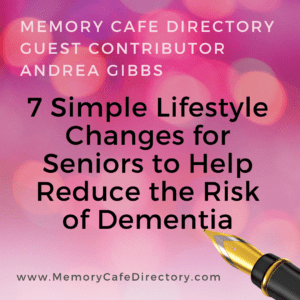Memory Cafe Directory posts and/or links to retailers can be advertising, sponsored, or affiliate links. We may earn a small commission from them. Thank you.
Guest Contributor: Andrea Gibbs
Dementia is the result of a brain disorder that can affect memory, language, and behavior. Alzheimer’s disease is an example of dementia. It is a progressive and long-term disease that gradually damages the brain.
It is one of the frightening concerns many of us have as we age, especially if we witnessed someone affected by the disease. There is no pharmaceutical cure for the disease just yet, but there are steps you can take to help your aging loved ones reduce the risk of dementia or delay its progression if they have already been diagnosed.
To deeply understand the nature of dementia and how it affects people’s behavior and cognitive ability, we will examine its various types.
Identification of the Various Types of Dementia
There are four major types of dementia. They include Alzheimer’s disease, vascular dementia, frontotemporal dementia, and Lewy body dementia. All of these types are progressive and can become lifelong conditions.
Alzheimer’s Disease
This dementia is the most common type of dementia. It begins with memory loss and confusion, which progresses to loss of other cognitive skills, including judgment, decision making, and personality changes. People with Alzheimer’s disease may become withdrawn, lose their social skills and ability to take care of themselves, as they lose independence and begin to require maintenance.
Vascular Dementia
It is caused by small strokes that damage the brain. As a result, people may have a loss of memory, personality changes, or behavior changes that are out of character. These symptoms can progress to becoming slurred speech or impaired judgment in response to daily tasks.
Frontotemporal Dementia
It is a type of dementia that affects the brain’s frontal lobes, responsible for one’s personality and behavior. People affected by this type may experience personality changes, difficulty with their speech, or loss of muscle movement on one side of their body. It is sometimes known as Pick Disease because the first person diagnosed with the disease was Dr. Pick.
Lewy Body Dementia
It is caused by the build-up of a protein called Lewy bodies in brain cells. The build-up of Lewy bodies may damage the brain’s nerve cells and result in memory loss, personality changes, impaired judgment, or behavioral problems. These symptoms may progress to feeling confused or losing balance and falling over when alone. It is important to note that Lewy body dementia can be complicated to diagnose and treat because it can mimic other forms of dementia, particularly Alzheimer’s disease. It is often confused with Parkinson’s disease.
The more you know about the type of dementia, the more you will recognize and understand your senior loved ones’ behaviors (if a diagnosis has been given). Also, knowing the nature of the disease will provide you with an idea of the ways you need to take to help your aging loved one reduce the risk of dementia. Controlling and Identifying the risk factors and making simple but effective lifestyle changes can maximize the chances of your loved one’s lifelong brain health.
Simple Lifestyle Changes to Help Your Senior Loved Ones Reduce the Risk of Dementia
While Age and genetics are outside your control, these seven brain-healthy lifestyles are within your control. The more your senior loved one strengthens each of the seven pillars in their daily lives, the stronger their brains will stay working. They will also delay the progress of more severe symptoms. These are the ways you can help:
1 Encourage Healthy Diet
It’s not just about losing a few pounds; it is also about making healthier food choices to battle dementia. Some researchers believe that eating fish can help delay the onset of dementia, and supplements like B12 are said to protect the brain. Senior citizens with a higher intake of fruits and vegetables are less likely to develop Alzheimer’s disease and other forms of dementia. Losing weight is a good idea, too, as obesity increases the risk for heart disease, diabetes, and stroke – all factors that can lead to cognitive decline.
2 Have Regular Exercise
Exercise has been proven effective in reducing the risk for dementia, but it is not only about aerobic workouts. A workout regime that involves any form of physical activity can help improve blood flow and oxygenate the brain.
Circulation, meaning good blood flow, helps remove build-up that might affect mental capabilities. Senior citizens are advised to walk or use the stairs every day and do some simple stretching exercises to increase mobility.
3 Stress Management
Researchers have discovered that stress can contribute to brain shrinkage in the long term and, consequently, the decline in cognitive function. It explains why so many seniors are prone to anxiety and depression. Therefore, keeping stress levels under control is essential to maintaining mental fitness.
Many seniors feel overwhelmed by the inevitable changes that come with living alone, so it’s necessary to have strategies to reduce stress. Make leisure time enjoyable for them, like encouraging them to play piano or listen to their favorite songs. Having them learning relaxation techniques such as meditation and Yoga can also ease their stress levels.
4 Mental Stimulation
Seniors often get bored with their daily routines or routine interaction. They need to remain intellectually active by reading a wide range of books and magazines or by keeping up with current events via newspapers and blogs. They should be encouraged to participate in classes and discussions to stimulate their brains. It will also help if you encourage them to learn something new like studying a foreign language, learn to paint, or practice a musical instrument—the greater the challenge, the greater the benefit.
5 Keep Them Involved Socially
Seniors need to bond with others and have social interaction. Many seniors live alone, so they must become part of a community or an organization that helps them meet other like-minded people who also hope to maintain mental health as they age. You can make a schedule to have them see their friends, get to know their neighbors, or have them visit the senior center.
Keeping your senior loved one engaged may protect against Alzheimer’s disease symptoms and other types of dementia in later life. So helping them develop a strong bond with someone who cares about them makes them feel heard is a priority.
6 Get Quality Sleep
Sleeping is one of the essential factors in maintaining a healthy brain. Senior citizens are often prone to sleep deprivation, which can lead to anxiety and stress. Poor sleep habits can increase heart disease and diabetes risk, both of which can contribute to dementia. Sleep deprivation may even trigger the brain’s immune system response.
If they experience pain or discomfort due to other health issues, encourage them to drink warm milk or take herbal teas such as chamomile, known for its calming effect. Have them regularly follow a regular sleep schedule, like going to bed and getting up at the same time. Also, encourage them to have a relaxing bedtime ritual like taking a hot bath, listen to relaxing music, and doing a few stretches.
As this becomes a habit, this will influence their brain for deep restorative sleep.
7 Maintaining Cardiovascular Health
The heart acts as the primary pump to supply blood and oxygen throughout. The heart and brain are closely related because of their dependence on each other for a healthy flow of blood and oxygen. Blood vessels deliver oxygen-rich blood to all cells, including brain cells essential to your seniors’ memory, language, thought, attention, reasoning capabilities, and more. When we’re young, our bodies produce new blood vessels with every heartbeat. It helps make an abundant supply of oxygen-rich blood for our brains.
As we age, though, the number of new vessels gradually decreases and is eventually replaced by clogged arteries that cause the heart to work harder and increase the risk of heart attack or stroke. Cardiovascular disease has also been linked to dementia since the tiny blood vessels responsible for cognition and memory are being damaged. Encouraging your aging loved one to have regular physical activity, eating a balanced diet rich in antioxidants, control their blood pressure, and not allowing them to smoke lessens the risk of dementia.
Conclusion
Aging can be a challenging time, but there are simple steps that you can take to ensure the brains of your loved ones stay healthy. By being proactive and making small lifestyle changes, you can prevent your senior loved one from the damaging effects of dementia.
Andrea Gibbs

Andrea Gibbs
Andrea Gibbs was born, raised, and is still living in New York. She’s a work-at-home mom with a background in business development, strategy, and social media marketing.
Andrea is a blog contributor at Serenity Senior care to motivate other parents about how they can enhance their elderly loved ones’ quality of life.
Become a Contributor!
 Do you want to be a Memory Cafe Directory contributor? If you have helpful information to share with our community, read about the guidelines, then get in touch to discuss what you have to offer.
Do you want to be a Memory Cafe Directory contributor? If you have helpful information to share with our community, read about the guidelines, then get in touch to discuss what you have to offer.
Thank you.







